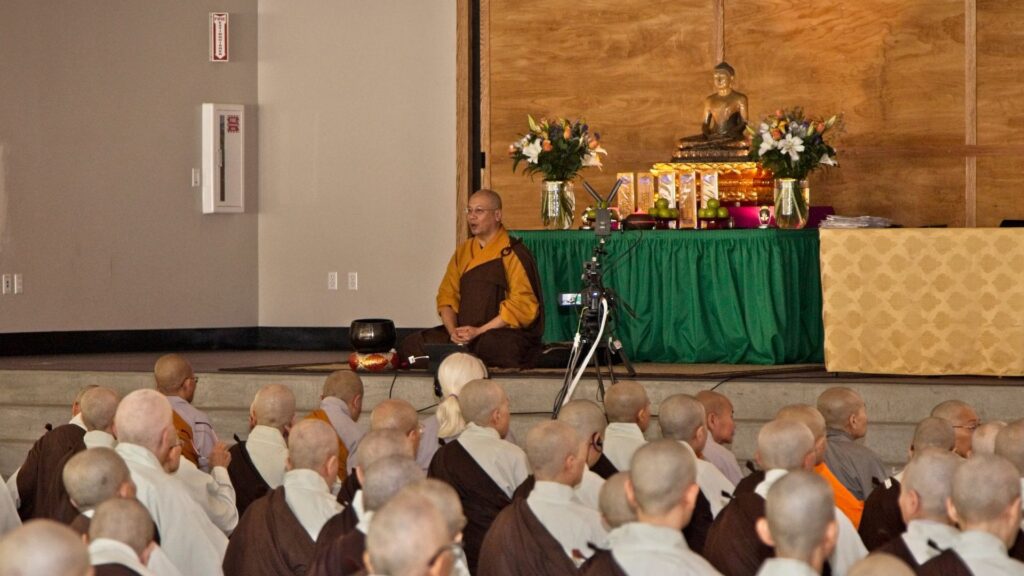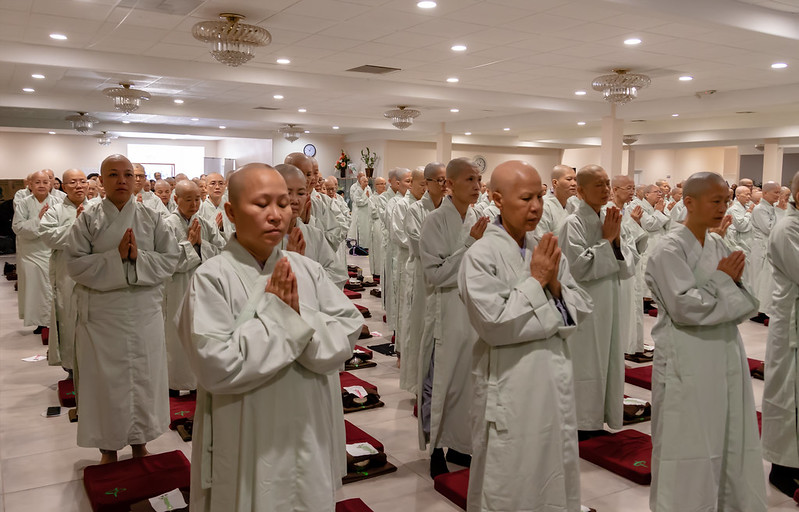(From the book Xuất Gia Vị Tha 2013) – Thầy Hằng Trường
Why the Altruistic Home-Leaving Program is Necessary Today
Leaving home to become a monastic has always been a great and noble merit since the Buddha did it and advised us to do it too.
There are three kinds of home leaving, according to the Buddha’s teachings:
1. Leaving at home the mundane and shaving the head to become a monastic for life.
2. Leaving at home the suffering of all attachments, greeds, desires, and selfish habits, cleansing away all mental grief. Those who leave the mundane behind usually succeed in letting go of their suffering, as do those with great virtues although they stay home.
3. Leaving the three realms of desires, forms, and formlessness. This requires diligent practice.
In Buddhism, arhats are truly those who have accomplished this. Leaving the three realms is the one of the noblest ideologies of a monastic since it was the main motivation for the Buddha to leave his palace for the forest in search of enlightenment.
When Mahayana Buddhism developed broadly, the ideology of leaving the three realms is complemented with the concept of returning to the three realms to help and save living beings.
That is the ideology of bodhisattvas who advocate the path of service, educating, and touching people’s hearts so they can build good, positive, and useful lives. In the Avatamsaka Sutra, this ideology is often manifested in the story of a bodhisattva working as a boatman who constantly and tirelessly ferries people to the other shore. He never thinks of what he will get or gain for himself, but only cares about taking his passengers to the other shore safely.
The boatman’s spirit is also the essential spirit of the Bodhisattva Path, namely the altruistic spirit. Advancing the Bodhisattva Path is developing the altruistic consciousness of serving others.

Thus, the so-called short-term home leaving (XGVT) has been created to develop the Bodhisattva Path for home leaving. A short-term home-leaving participant also shaves their head, temporarily leaves home, and practices being a monastic for a week or two, or a month or two. During this time, the short-term monks or nuns will practice hard not for their own sake or liberation, but on behalf of someone else, or dedicate all merits to a person or a group of people who need merits and prayers.
An essential difference between lifelong monastics and short-term monastics is the precepts. For the former, a monk receives 250 precepts and a nun, 348 precepts. For the latter, both novice monks and nuns receive only 10 precepts, since the practice time is too short to learn and understand fully the precepts’ meanings. Besides, short-term monastics still have families, jobs, and social responsibilities, so the XGVT program only wants to introduce the noble content of the home leaving path instead of focusing on in-depth details.
In fact, they will be guided so they can easily feel the greatness of transcending worldliness, the beauty of home leaving, the noble spirit of the awakening path, and the purity and serenity of a monastic life. From feeling to experiencing and appreciating, short-term practitioners will unfold their Bodhi minds and resolve to follow the Bodhisattva Path. This is the most important direction of the Altruistic Short-Term Home Leaving program of CSS, so called to emphasize the spirit and foundation of the program.
Since the inception of the XGVT program in 2006, all participants have left home on behalf of their loved ones, their friends or acquaintances, or a group of people suffering from a natural or man-made disaster.
Anyone can join the altruistic sangha. Once they resolve to do so, they have to shave their heads, receive and uphold ten precepts, learn about the proper deportment and conduct of a monastic, and bring forth the mind to apply the Buddhist quintessence in daily life. In so doing, they maintain the precepts, continue to practice the Buddha’s teachings, and prove worthy of the help and support from dharma supporters, volunteers, lay people, and believers.
Thus, the very positive and goodness-oriented nature of the Altruistic Short-Term Home Leaving program can truly develop its benevolent purpose and influence in our family, community, and everyone in our web of affinity.


